I cannot think of a better time than Tolkien Week to reflect on how the author J.R.R. Tolkien has inspired us. Though we all come from different backgrounds, Tolkien has affected each of us in a big way, and we, The Middle-earth News reporters, would like to share why we are indebted to The Professor.
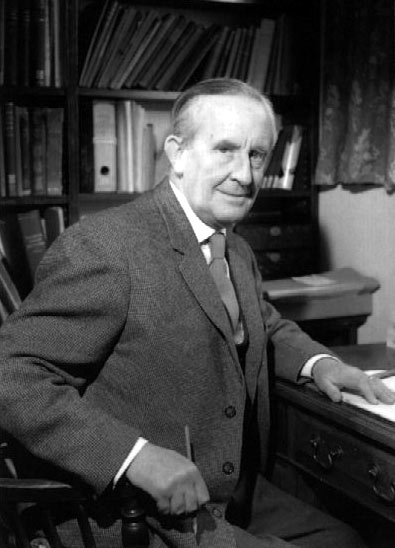 Lily: I tend to think of reading as a reclusive pastime, but Tolkien is an entirely different story. My first experience with Tolkien was hearing The Hobbit read aloud on Friday afternoons by my middle school English teacher. It was purely for entertainment; there were no pop quizzes and no essays to write. We simply enjoyed the story as it unfolded, sharing a laugh or a shudder, or holding our communal breath. Becoming a Tolkien reader was like gaining entrance to a secret club where the password was Gandalf!
Lily: I tend to think of reading as a reclusive pastime, but Tolkien is an entirely different story. My first experience with Tolkien was hearing The Hobbit read aloud on Friday afternoons by my middle school English teacher. It was purely for entertainment; there were no pop quizzes and no essays to write. We simply enjoyed the story as it unfolded, sharing a laugh or a shudder, or holding our communal breath. Becoming a Tolkien reader was like gaining entrance to a secret club where the password was Gandalf!
Through Tolkien, I have joined many fellowships of fans who bring so many unique perspectives to the table. On forums, at readings and book discussions, and here on Middle-earth News, I digest each chapter personally, as well as collectively. In doing so, I rekindle a love for the characters, landscapes, and language I thought I already knew so well, while at the same time, I create friendships that expand beyond the writings of Tolkien.
I don’t know if The Professor ever realized the ripple effect his writings would inspire, but I’m sure he would be pleased that the kinds of friendships he wrote about could be built surrounding the very same works of fiction.
“You can trust us to stick to you through thick and thin – to the bitter end. And you can trust us to keep any secret of yours – closer than you keep it yourself. But you cannot trust us to let you face trouble alone, and go off without a word. We are your friends, Frodo.” Merry, The Fellowship of the Ring, A Conspiracy Unmasked
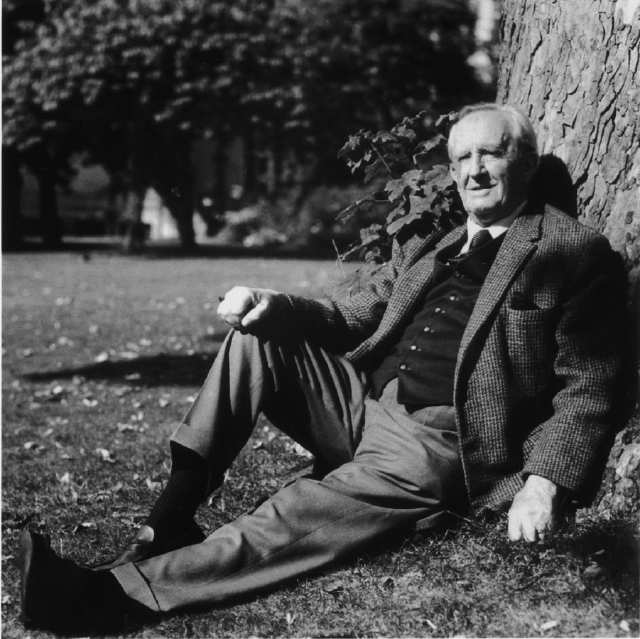 Britta: I have only been a fan of J.R.R. Tolkien’s for about eleven years now; but at the age of twenty-two, that seems almost like an entire lifetime. I first read The Hobbit at a time in my life where I despised the fantasy genre; the first time my mother suggested I read it, I remember crying out, almost with disgust, “What the heck is a hobbit? Sure sounds like something I wouldn’t enjoy!”
Britta: I have only been a fan of J.R.R. Tolkien’s for about eleven years now; but at the age of twenty-two, that seems almost like an entire lifetime. I first read The Hobbit at a time in my life where I despised the fantasy genre; the first time my mother suggested I read it, I remember crying out, almost with disgust, “What the heck is a hobbit? Sure sounds like something I wouldn’t enjoy!”
But after some more pressing, I caved. Giving this book a chance opened my eyes and showed me that the genre could not only be fun, but that it could also possess a sense of realism that I never thought was possible. As I read The Hobbit for the first time, it was easy to forget that in our world, creatures like Hobbits, Orcs, stone-trolls, and dragons don’t exist. I like to think Professor Tolkien inspired me to read with an open mind and give all genres a chance, regardless of any preconceived notions I might have.
Moving on to The Lord of the Rings, I became even more engrossed in Tolkien’s world. Middle-earth was complex and so deeply constructed that it didn’t feel like a setting made up for the sake of telling a story; rather, it felt like a place which actually existed.
Even if it wasn’t technically a real place one could visit, Middle-earth was an exciting escape from “the real world.” I spent the most important years of my life (in terms of growth and development) reading and carefully studying everything Tolkien had written about its inhabitants. To some extent, I separated myself from my peers, who found it odd that I could spend so much time with my nose in a book, let alone one as “geeky” as The Lord of the Rings. But while everyone else was struggling to fit in, I was slowly discovering myself and my passions.
Perhaps most importantly, my passion for Tolkien helped me to branch out of my comfort zone. An introvert with an aversion to public speaking, I started an after school Tolkien book club/classroom, where I took on the unfamiliar role of teacher and helped my friends and classmates further understand the points Tolkien was trying to make, while occasionally teaching them Elvish phrases or the traditions of the various cultures in Middle-earth. It was at that time someone remarked that I would one day shine as a teacher of Tolkien’s writing, and that was when I knew I had found my calling.
I like to think that Professor Tolkien inspired me to become a better reader, writer, and student.
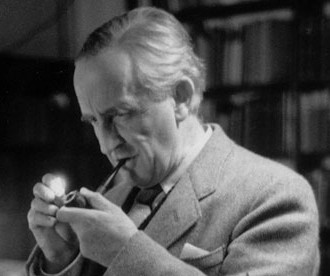 James (aka Bandoras): I have a confession to make.
James (aka Bandoras): I have a confession to make.
I hated Tolkien when I was a boy. He was long-winded, stuffy and boring. What kind of story has a protagonist who’s a short, normal guy? What kind of adventure features a perfectly bland ordinary “hero.” This wasn’t the kind of hero I wanted in my stories. I wanted big explosions, swords made of lasers, and larger than life knights who leaped from the page and slew the dragon in single stroke. I wanted someone who achieved victory unchecked and unchallenged.
Then I got a little older and a little wiser and I came to the realization that I was, in fact, normal and ordinary person. I was a work-a-day kind of guy who valued a nice meal and a good smoke. These were real, achievable things in my life in which I found great joy. Certainly, starfighters and majestic beasts were great – but that wasn’t my life. That wasn’t me and as I got older, it was something that I just couldn’t relate to.
Then, when I was nearly thirty, I read The Hobbit, again for the first time. Bilbo suddenly made perfect sense to me. If thirteen strangers armed and rowdy showed up at my door with a mad old codger who I only knew by reputation, I’d like to think I’d turn them away at the door. I’d like to think I’d cast them away. But, let’s be honest – most ordinary people are passive. We bend, for politeness’ sake. So, like Bilbo – I’d awkwardly invite them in for tea. Like Bilbo, I’d listen to their story. And, like Bilbo, when they mocked my virtue something Tookish would well up in me and I’d recklessly challenge their notions of who I am without realizing exactly what I was getting myself into. I’d make a rash decision – like most of us would. And like most of us, I’d be thinking about creature comforts all along the way. I’d miss my home, my chair, my dog.
And that’s when it all changed for me. Tolkien takes these characters that he calls hobbits, who are painfully ordinary, and he teaches us the most important lesson we could ever learn: Ordinary people are the ones who are heroes. Ordinary people can rise above their own limits. Ordinary people can change the world. And they do.
Tolkien takes the character of Bilbo (and the other hobbits as well) and places them in a world vastly different from our own – yet it feels so very, very real that we believe Middle-earth might exist somewhere on the other side of that gate, or just around the bend. It’s lived in, it’s breathing, it’s ALIVE. These characters come from a place just as real as our world – and they’re no less terrified of the dangers beyond their doorstep.
But they make that choice. They take that first step. They have something Tookish about them, and so do we. Tolkien’s words changed my life by showing me that the simple conviction of ordinary people (whom he calls hobbits) is the most powerful force in his, ours, or any world.
Here’s to you, Professor.
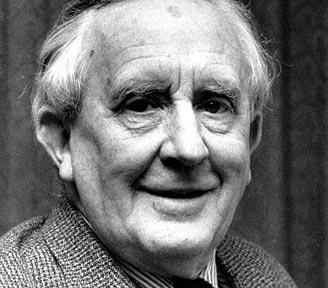 Arwen: No matter how many times I read through The Hobbit, The Lord of the Rings Trilogy, or The Silmarillion, I’m always amazing at how intricate the world of Middle-earth is. Tolkien put so much time and thought into each character and their story lines that, when you walk away from them, you feel as though you’ve just read a long lost piece of actual history. I believe the passion he put into his novels are what make them so memorable. You don’t spend years creating multiple languages, unique cultures and traditions, or describing vast landscapes without your own heart being behind the project.
Arwen: No matter how many times I read through The Hobbit, The Lord of the Rings Trilogy, or The Silmarillion, I’m always amazing at how intricate the world of Middle-earth is. Tolkien put so much time and thought into each character and their story lines that, when you walk away from them, you feel as though you’ve just read a long lost piece of actual history. I believe the passion he put into his novels are what make them so memorable. You don’t spend years creating multiple languages, unique cultures and traditions, or describing vast landscapes without your own heart being behind the project.
So, for me, it’s Tolkien’s passion and love for those stories that inspires me most, and it’s that inspiration which propels me to put all I can behind the projects I take on.
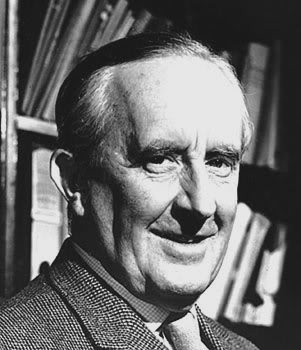
Steve (aka Rifflo): Tolkien helped develop my imagination and creativity at an early age. When I was a young boy, there was a time I was introverted and spent much of my time inside reading books on knights and dragons, but most of all, reading Tolkien. My first Tolkien book was The Hobbit. What inspired me about The Hobbit was that an unassuming creature like Bilbo, being of small size and not considered very important by the outside world, was able to become a great hero and find his inner spirit! This then triggered my creativity in writing fantasy stories. Along with playing Dungeons and Dragons with friends, Tolkien inspired my own fantasy stories that seemed to always involve an unlikely hero.
As time went on when I began to understand and dig deeper into the works of Tolkien and his life, it influenced my spirituality. Being a Christian, knowing of Tolkien’s own spiritual belief and that much of his works reflected this, connected with me on a personal level. Tolkien’s own words of “If more of us valued food and cheer above hoarded gold, it would be a much merrier world.” reminds me so much of much that is said in the Christian Bible about greed, such as “Then [Jesus] said to them, ‘Watch out! Be on your guard against all kinds of greed; a man’s life does not consist in the abundance of his possessions.'” Luke 12:15.
Tolkien and his works influenced my creativity, confidence, and spirituality.
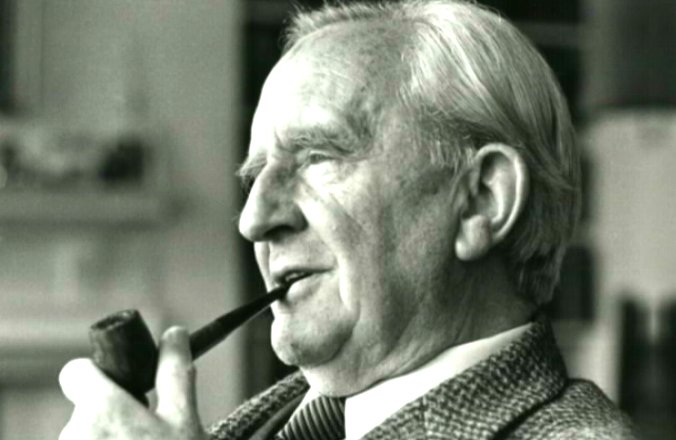 Oloriel: Looking back into my childhood, there are glints – like shining stones on a path – of Faerie. I’ve washed my face in the dew of the first May morning, discovered a hidden woodland stream, and played with old coins of unknown origin. These precious moments notwithstanding, I had little overt fantasy in my upbringing, and I didn’t truly find Faerie until I found Lord of the Rings.
Oloriel: Looking back into my childhood, there are glints – like shining stones on a path – of Faerie. I’ve washed my face in the dew of the first May morning, discovered a hidden woodland stream, and played with old coins of unknown origin. These precious moments notwithstanding, I had little overt fantasy in my upbringing, and I didn’t truly find Faerie until I found Lord of the Rings.
To say that a book changed one’s life is banal, but there it is: Lord of the Rings changed my life.
When The Fellowship of the Ring came out, I was twenty. I had just finished my first British Lit class (on a lark – I was undecided on a major after leaving Biology) and I was in love with it. That was the winter that I became a Tolkien fan, the winter that I found my subculture, the winter that I found – at least in part – myself.
Until that point I had never had much of a solid identity. I liked things – cheerleading, music, science – because I wanted to be like the people who liked them, not because of genuine interest. Tolkien enchanted me entirely. I could see things now, simple things, and see their magic. Wax candles, the stars, woolen blankets, the campus lawn: all became sacred. They were holy in their ordinariness. I was overcome.
To my mind, the most important thing that Tolkien’s writing imparted to my views is what C.S. Lewis calls the True myth. As one of those Jesus types, I found myself at last face to face with the fact that I am living the true myth, and that all of the sacredness I first saw is mine to delight in, to keep forever, in a way. My favorite passage in the whole series is the exchange between Aragorn and one of Eomer’s riders. The rider scoffs at the notion of halflings, and asks, “Do we walk in legends or on the green earth in the daylight?” Aragorn replies:
“Not we but those who come after will make the legends of our time. The green earth, say you? That is a mighty matter of legend, though you tread it under the light of day.”
Happiest of Tolkien Weeks, everyone.
Of course, all of this begs the question: How has Tolkien inspired you?



Pingback: A Tolkien Week MUST READ Article | Unearthing Words